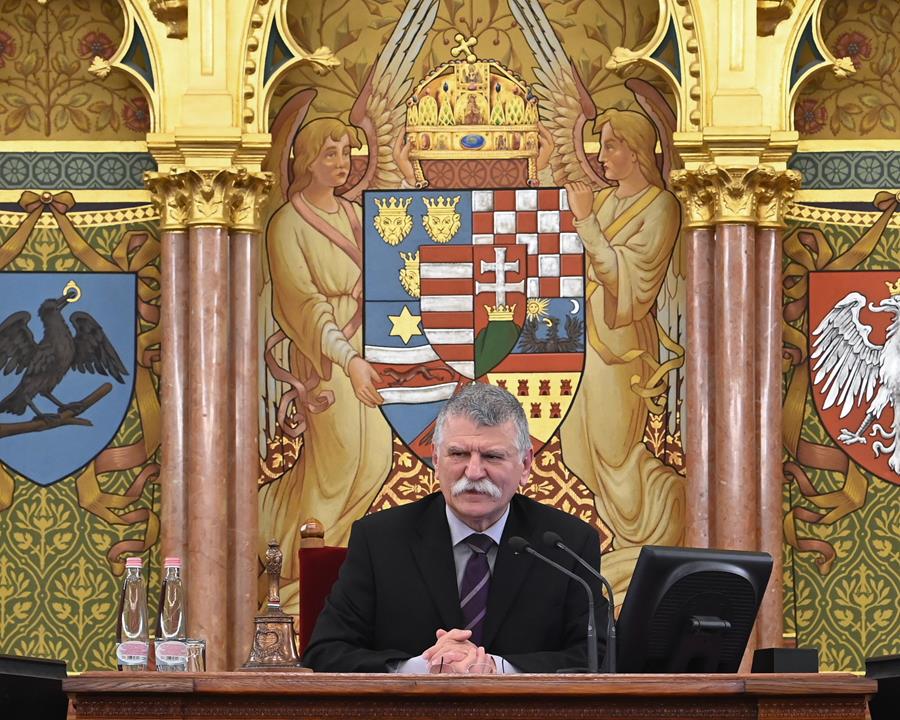Change language:
Considerable financial support for Hungarians living in Ukraine, says Speaker Kövér
The biggest challenge for Hungary in respect of the war in Ukraine is to help the Hungarian community in the Transcarpathian region survive and retain and protect the community’s institutions, László Kövér, the speaker of parliament, said in an interview published by online business magazine Az üzlet on Friday.
Speaker Kövér: government continues to provide subsidies
In terms of Hungary’s policy towards ethnic Hungarian communities, “the greatest change has been the armed conflict between Russia and Ukraine… The Transcarpathian Hungarian community is fighting for its survival, and the mother country must help them,” Kövér said.
Thanks to the Hungarian government’s subsidies and effective organisation in Transcarpathia, Hungarian institutions have not collapsed, Kövér said, adding that “deputies of the Hungarian parties continue to carry out their jobs in municipal governments despite difficult circumstances.” Church and civil organisations are also active, while Transcarpathian schools have reopened “after the initial shock”, Kövér said, noting that the third academic year had started amid war circumstances.
The government is continuing to provide subsidies for church-run schools, educational and cultural organisations, as well as the II Rákóczi Ferenc college in Transcarpathia.

In 2024 more than 7,500 low-earners received a one-off payment, and over 4,000 children in kindergartens and primary schools have been given daily meals, he said.
Kövér said Hungary’s policy was aimed at reaching out “to as many Hungarians as possible”. The survival of Hungarian communities hinges mostly upon their retaining their national identity, therefore the policy aims to ensure that young people have access to Hungarian culture and they can cultivate their traditions, Kövér said.
Kövér hopes the Hungarian community in Slovakia will also show unity
The speaker highlighted the government’s Határtalanul (Without borders) Programme, through which over 500,000 Hungarian students can visit communities outside Hungary and the Rákóczi Association‘s camping programme offering holidays to an annual 15,000 Hungarian students from the Carpathian basin and the diaspora.
Speaking about the foreign ministry’s economic promotion programme designed to finance developments by ethnic Hungarian entrepreneurs, Kövér said the scheme promoted regional business cooperation under which “being a Hungarian businessman in another country is now an advantage rather than a drawback.”
Meanwhile, he said “ethnic Hungarians can rely on support from the mother country amid all circumstances… Hungarians in Transcarpathia can feel the active solidarity of not only the people in Hungary proper but in other ethnic Hungarian communities.”
Concerning the Hungarian community in southern Slovakia, Kövér said the community would benefit “from a level organisations such as that of Transylvania or Vojvodina Hungarians” to participate successfully in the next Slovak elections. “Let us hope that the Hungarian community in Slovakia will be able to show such organised unity,” he said.
Hungary provides support worth over HUF 98 bn to Ukraine since outbreak of war, says government official
Hungary has provided 98.5 billion forints (EUR 239.8m) worth of funding to Ukraine over the past one thousand days of the Russia-Ukraine war and the refugees arriving from the neighbouring country, the state secretary for religious affairs at the Prime Minister’s Office said at the Beregsurány border crossing on Friday. At a press conference, Miklós Soltész highlighted the enormous contribution of six charity organisations which have delivered 5,500 tonnes of food, clothing and medical equipment in aid worth a total 13 billion forints to Ukraine.
Hungary has so far catered for 1,437,000 refugees in a massive collaboration, Soltész said, adding that at the five aid centres operating at the border 673,000 people have been received. In its largest ever humanitarian operation, Hungary has provided support to refugees in the form of accommodation, meals, clothing, medical care, employment, education and free transport and free vacation to families, the state secretary said.
He noted that Hungary also gave help to Ukraine in the energy sector in the form of electricity transmission. Soltész said Hungary will continue to cater for refugees, regardless of whether they are of Polish, Ukrainian or Hungarian origin.
Read also:
- Ukrainian county inhabited by Hungarians, Transcarpathia, under Russian attack!
- Transcarpathian Hungarians at risk: Russian strikes threaten secret Ukrainian facility just 12 km from Hungarian border








The vast majority of the 1.1437 million refugees from Ukraine received nothing more than a rubber stamp in their passport acknowledging their entry into the EU so that they could continue their journey to countries they consider friendly further west. To suggest otherwise is disingenious and makes light of their suffering.